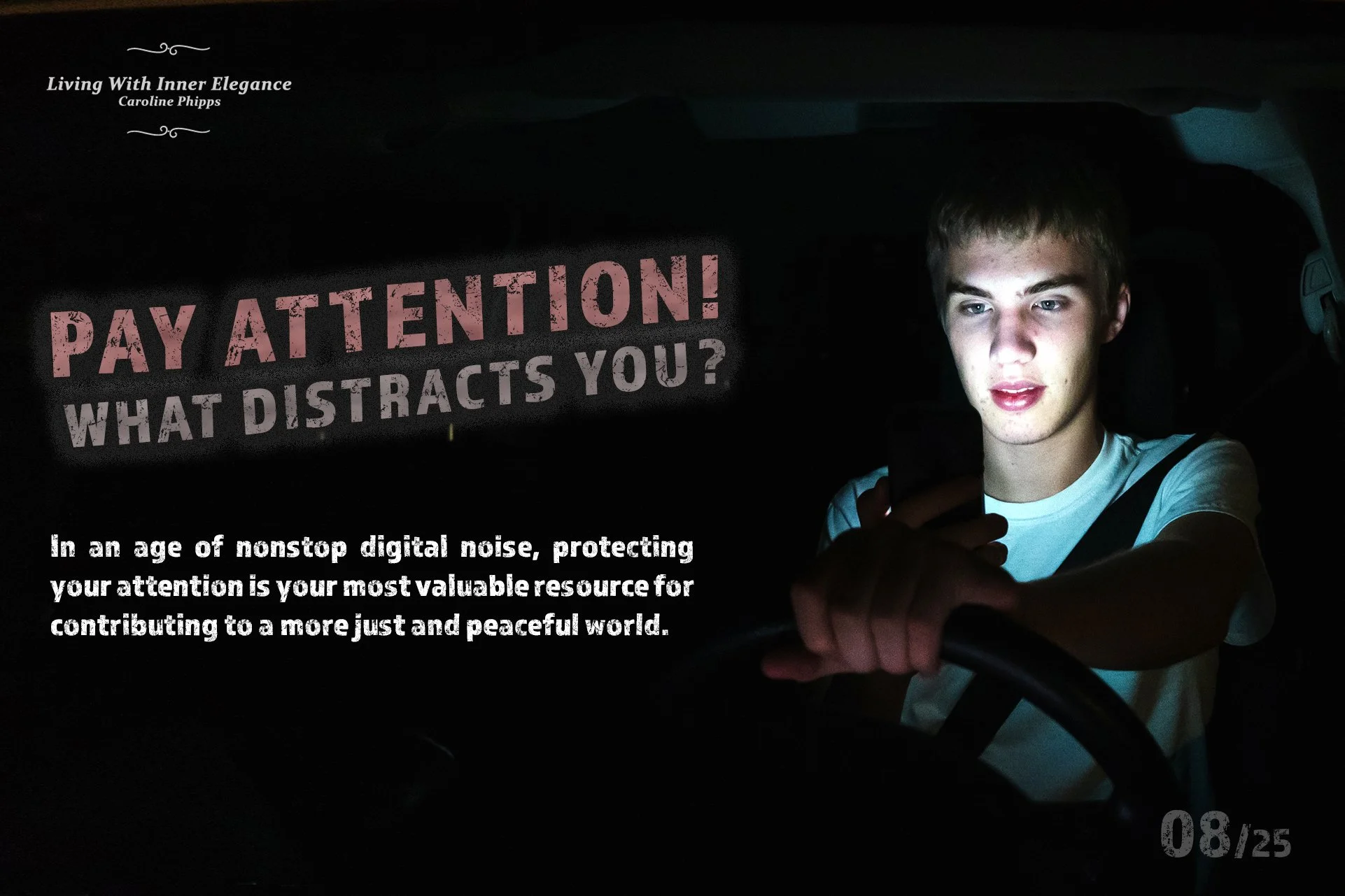
elegant aspirations
August 2025
Pay Attention!
What Distracts You?
In an age of nonstop digital noise, protecting your attention is your most valuable resource for contributing to a more just and peaceful world.
By Caroline Phipps
A wealth of information creates a poverty of attention.
Herbert A. Simon
Nobel Laureate Economist
We all know what it’s like to have dinner interrupted when somebody pulls out their cell phone, waves it in front of our face, and insists we watch a video or photograph presented as a vital must-see moment. We’ve all driven behind someone who keeps going off the road as they text and drive. Recently, in New York City, it was hard to find anyone who wasn’t looking down at their phone or wearing headphones.
We're becoming increasingly distracted as we invest more and more in a virtual life. Today's environment is often described as one of "peak distraction”, and this is now a global phenomenon. Americans, for instance, check their phones frequently, with some estimates exceeding two hundred times per day.
Distraction overload has been decades in the making. Back in the 1970s, Economist Herbert A. Simon saw the direction in which things were headed and realized that in a world overflowing with information, what really gets scarce is our attention. These days, accessing vast amounts of information is easy. The challenging part now is prioritizing what truly matters to you and improves your life while navigating the adverse effects of distraction.
Distraction creates constant overstimulation and addictive tendencies that knock you off balance. When your senses are constantly bombarded, you become desensitized to it and require more and more of it to satisfy your cravings for distraction. Besides causing anxiety and overwhelm, distraction dulls your intellect and compromises creativity, original thinking, and real-time connections with others. Fearing that we might miss out on something (FOMO) is a very real mental health concern, along with loneliness, isolation, and community breakdown.
On the creative side, this phenomenon accounts for why many current mainstream films, TV, and music have a way of all sounding similar. When Rolling Stone Magazine updated its list of the 500 Greatest Songs of All Time in 2021, it was staggering to note that, in the period from the 1930s to the 2020s, 28.2% of the songs came from the 1970s, while the 2010s accounted for only 5.8%. This suggests that the scarcity of information and significantly less outside influence allowed creatives in the past to be more inspirational and original.
Desensitization, isolation, and lack of creativity are particularly perilous states of mind in today's turbulent world, where attention would be better focused upon our mental, physical, and spiritual health so that we can contribute to a more peaceful and just world. The weaponization of distraction is nothing new when it comes to manipulating people. A poet named Juvenal in Ancient Rome famously wrote, "Give them bread and circuses and they will never revolt." In the Roman Empire, bread, chariot races, and gladiatorial games were used by the emperors to satisfy the people's hunger and distract their minds from the unpleasant realities of inequality and corruption. Today's equivalent of bread and circuses is evident everywhere, as politicians and other powerful entities use our technology dependence to get attention, sell us something, and distract us from reality.
As overwhelming as technology and the relentless flow of information are, it's essential to remember that we do have a choice. It is part of our survival mechanism to be distracted by the instant gratification of proverbial bright, shiny objects. Still, we also have the capacity and choice to outmaneuver reflexive behavior and replace it with mindfulness.
So, turn off your electronics and ask yourself, what distracts you and what helps you? What are you looking for? What are you in need of? On the positive side, taking a deep dive into a particular topic and gathering necessary information for your well-being is one of the great benefits of the digital age. Just as relaxing after a long day with your favorite source of entertainment is a great way to unwind.
Here are some questions to consider when assessing your level of distraction: Are you struggling to prioritize and focus on one task at a time? Are you easily overwhelmed, agitated, or frustrated by the constant need to process information and feeling the urge to respond continually? Are you less productive because you keep switching your attention between tasks and constantly have to refocus? Are you struggling to find creative solutions to problems? Is it challenging to make meaningful connections with others? Do you feel as if you’re constantly skimming the surface and unable to pay close attention to things that matter? Are you getting distracted by distraction creators or content creators that matter to you?
Once you’ve assessed your particular challenges with what distracts you, establish some guidelines to follow, just as you would with a physical fitness plan. Mindfulness is the key to altering reflexive behavior and making it simple. For instance, it may be the number of hours you spend in front of a screen, or the times of the day that you turn it all off, or go out, leaving it all behind.
These strategies will enable you to pay complete attention and take notice of things you have been missing. This will empower you because it allows you to gain your unique perspective, which makes you less vulnerable to manipulation and negativity, strengthens your resolve, and enhances your ability to solve problems and think creatively. The choice between accepting the world at face value by skimming the surface or paying attention and participating in what truly matters to you will determine the outcome of these unprecedented times.

